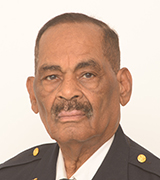Guest Editorial
All Lives Are Sacred
Building Good Relationships With Communities

The tragic death of George Floyd at the hands of a Minneapolis police officer and subsequent police shootings throughout our country have drawn worldwide attention to the use of force by the men and women from some of the 18,000 law-enforcement agencies in the United States. A main concern is that use of deadly force is disproportionally applied to Black people. I believe that all lives are sacred. But as you might imagine, the attitudes and demographics of police officers reflect the same attitudes and demographics of America—with both its virtues and faults.
During my long tenure as a law-enforcement officer, I have found most of my fellow officers to be honorable and brave people. There are some, however, who have joined law-enforcement agencies to express biased views and exhibit violent behaviors. And there are some who will tolerate actions they don’t agree with, just to go along to get along.
It is very disheartening to be lumped in with the officers who disgrace this honorable profession.
I was watching the news recently while a Montgomery County police officer was explaining that recruiting new officers was becoming very difficult and that the retirement rate had increased from approximately one a month to approximately 20 a month. The problems are most likely due to the unfavorable portrayal of our profession in the worldwide news media.
I personally believe some of the citizens’ mistrust of the police is because of a disconnect between the two groups. Law-enforcement agencies need to focus more on community policing, in which officers build relationships within the community and work in proactive partnerships with citizens to identify and solve problems. “I like to think of it as having a bank account of good will with the communities,” Dave Mitchell, chief of police at the University of Maryland (College Park, Maryland), once said. “No matter what agency you represent, at some point a withdrawal [against this account] will have to be made, whether you want to or not.” The idea is that with enough feelings of good will, community members will trust that the police—even when responding to possible criminal activity—are always acting in the community’s best interest.
Chiefs and other law-enforcement agency officials must root out nonconforming cultures in their organizations that violate the constitutional protections of the citizens they serve. Police officers should understand that they must enforce laws equally, even against fellow officers who are abusing the rights of citizens. Officers must understand they will be held accountable for acts of omission as well as acts of commission. Chiefs must do what is right, no matter if they will have to pay a personal price for their actions or decisions.
Having personally commanded many long and stressful events in Washington, D.C., New York City, and Fort Chaffee, Arkansas, I know at times you must relieve officers and even subordinate commanders when they can’t be objective and get too emotionally caught up in certain events or activities.
Police agencies must look inward and ascertain if their policies adequately protect the constitutional rights of the citizens they are sworn to protect. Those policies must also be effective in causing the sanctioning or dismissal of noncomplying officers.
Agencies must ensure we are being guardians of all citizens, no matter what their race, gender, and/or station in life. We must be warriors when threats are made against our charges, we must be brave when our citizens need to be rescued, and at times we must disregard our personal safety so others may survive.
I am an optimist and believe we can gain our citizens’ support and trust if we make the proper investments required to transform our profession. I am pleased to let you know we have some fantastic officers at the NIH. We are all committed to partnering with members of the NIH community to ensure the safety and security of employees, visitors, patients, and contractors and the protection of NIH’s research and knowledge assets.
Alvin D. Hinton has been the chief of police at NIH’s Division of Police since January 2000. He began his law enforcement career with the United States Park Police (USPP) in the Washington, D.C., metropolitan area and later commanded the USPP New York Field Office, Training Branch, and Major Crimes Unit. He also led USPP law-enforcement efforts at the Cuban Relocation Program at Fort Chaffee, Arkansas. He is a graduate of the FBI National Academy, has a B.S. in administration of justice from American University (Washington, D.C.), and an M.S. in management from Johns Hopkins University (Baltimore). During his career, Hinton has managed many high-profile events and participated in the transition process for upgrading the security processes for the NIH after the September 11, 2001, attacks.
This page was last updated on Wednesday, March 23, 2022
